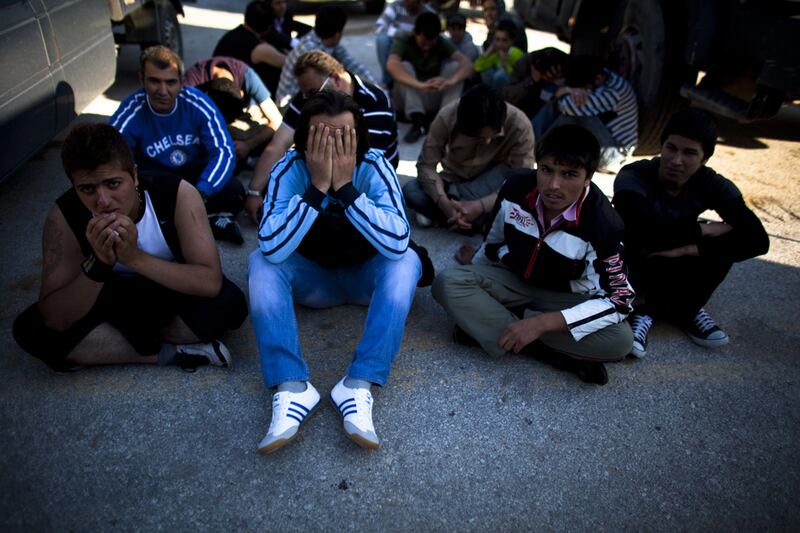The United Nations Agency for Refugees (UNHCR) has called the current global displacement crisis the largest since the Second World War. The total number of refugees, asylum seekers and internally displaced people exceeds 51 million, with the Mediterranean region at the heart of cataclysmic migration flows.
The shores of Greece and Italy have become major routes to Europe for many of these desperate people. This year, debt-laden Greece surpassed Italy in terms of number of refugees, with the UNHCR estimating that 77,000 arrived by sea. The International Office of Migration estimates another 1,000 will arrive each day.
Despite economic turmoil on their own soil, residents of Lesbos and Kos have been providing food, clothes and other essentials to those who reach their shores. While there was a sharp rise in xenophobic attacks in Athens in 2012 and 2013 when the debilitating impact of austerity started to materialise, Greeks living on the islands have been largely empathetic towards refugees. Food and clothing drives to help those arriving by sea are quite common in these communities.
However, rising impoverishment among Greeks has meant that the free healthcare clinics that were primarily set up to serve those people without documents are now receiving more and more local patients. Greeks now constitute at least 50 per cent of charity recipients.
The country simply cannot help those arriving in unprecedented numbers without concerted cooperation between international, national and local aid agencies. Europe has a specific responsibility to help Greece deal with the unabated influx. Greece needs the same level of immediate financial support as other middle-income countries – Jordan, Turkey and Lebanon – that have received large numbers of Syrian refugees. In addition to meeting basics needs such as food, shelter and clothing for the new arrivals, the European Union must start implementing its proposed emergency mechanism by which asylum seekers are resettled proportionally among its 28 member states.
So far, response from the EU has been abysmally slow. The International Rescue Committee has stated that “Europe's inability to support Greece means [we] have to send staff to the richest region in the world”. Given the EU’s humanitarian aid budget of €1 billion (Dh3.9bn), it is appalling that emergency aid to Greece continues to lag.
The sight of asylum seekers taking over abandoned buildings and setting up makeshift tents in parks is glaring proof that the Common European Asylum System is ineffectual.
While a plan to resettle 40,000 refugees from Italy and Greece in other EU member states has been put forward, the details of immediate aid to Greece have not been discussed. The resettlement scheme itself has not even begun.
The lack of willingness from affluent northern states to take in refugees is apparent in the actions of the UK and Ireland, who intend to exercise their “opt-in” rights. In other words, they are not obliged to participate unless they choose to do so. Denmark has an “opt-out” right, which means that it will not participate at all.
Furthermore, the number of people to be resettled – a mere 16,000 from Greece – is simply not enough given the colossal rates at which migrants are entering the country. More than 60 per cent of those who have arrived on Greek shores are Syrians escaping conflict. A majority would qualify for asylum and all are non-returnable cases due to the imminent dangers they would face if repatriated.
What is worrisome about this new agenda is the insistence of the EU Commission on systematically fingerprinting all those entering Italy and Greece under the premise of avoiding secondary movement of those who will be resettled. But this also means that the plan will reinforce asymmetrical burden sharing under the Dublin agreement, under which asylum seekers entering the EU can be returned to their port of entry. Given that a majority of refugees enter through Italy and Greece, the northern European countries will continue to be absolved from responsibility for those who are not part of the resettlement scheme.
The second part of the agenda aims to thwart the migrant-smuggling trade by having stricter border patrols and potential military offensives against smuggling boats in the Mediterranean. This is a reckless method that would compromise the safety of those being smuggled and undermine the sovereignty of states that are the default transit points.
Those looking to flee to Europe will continue being resilient, invent new routes and alter their means of travel. The sudden increase in arrivals from Turkey to Greece and via the western Balkans is indicative of an unceasing phenomenon.
It is high time that a refugee quota fund that distributes the burden across the 28 member states of the EU was implemented. But the north-south divide in the EU that became apparent over the latest austerity measures exerted on Greece bears strikingly similar parallels on the issue of migration. Southern European countries are bearing the brunt of migration, while northern neighbours continue to turn a blind eye as long as the crisis does not reach their doorsteps.
Preethi Nallu is working on a multimedia project called Parallel Journeys: Seasons of Migration that explores the Mediterranean crossings through individual narratives





